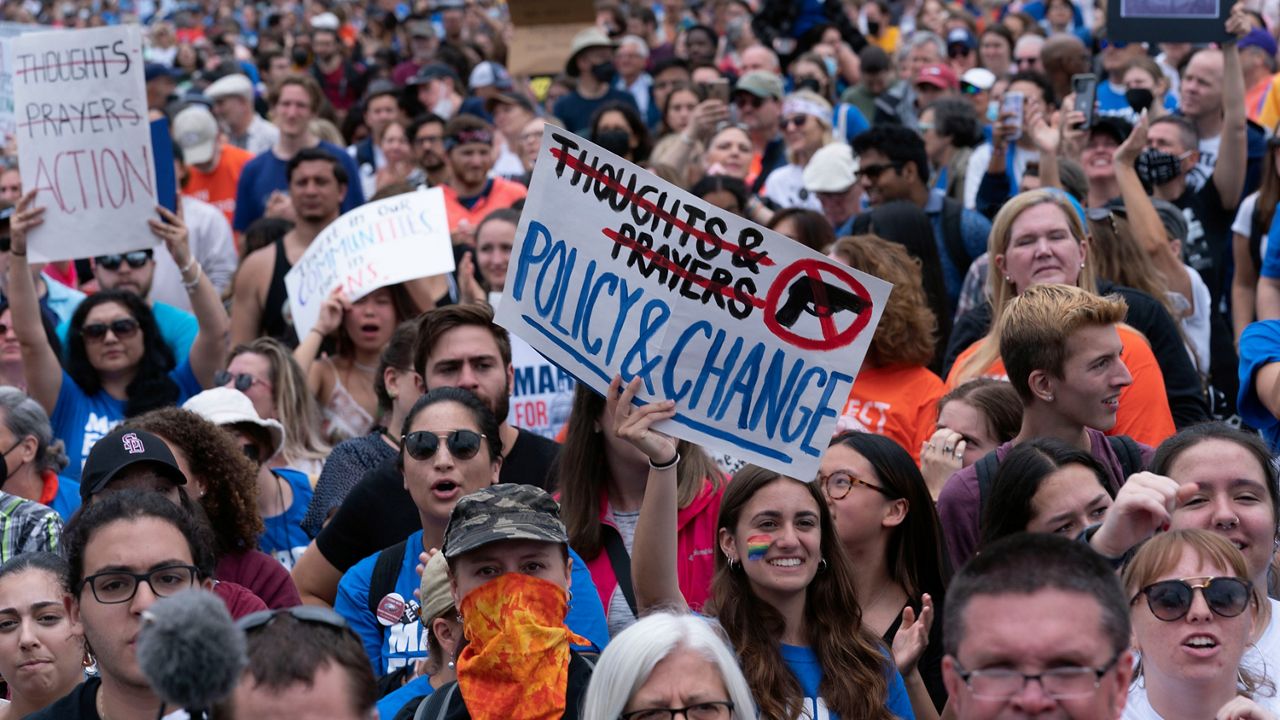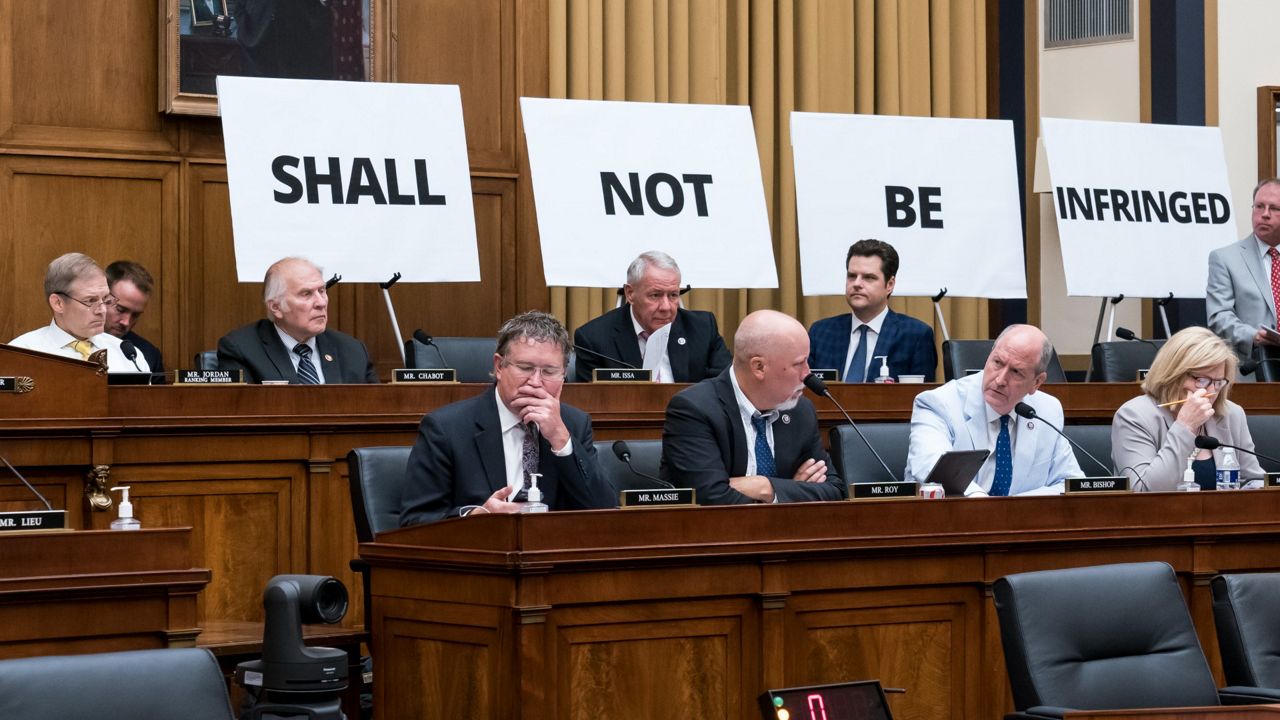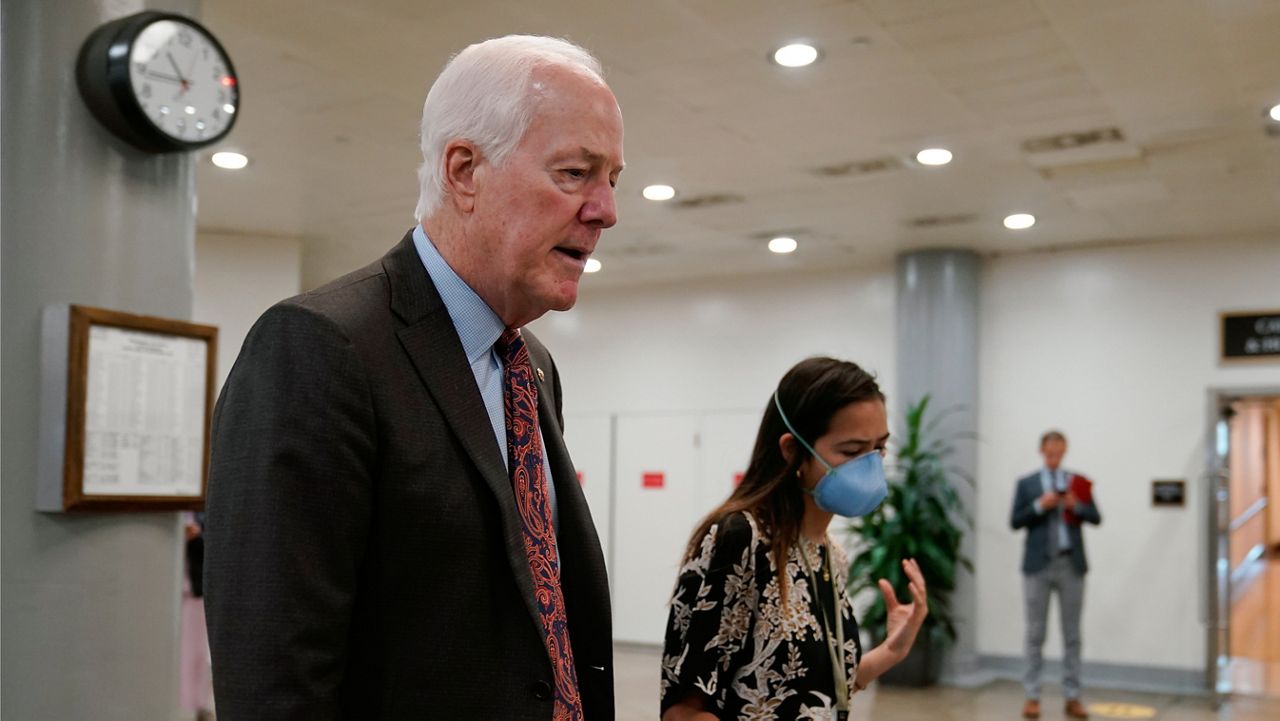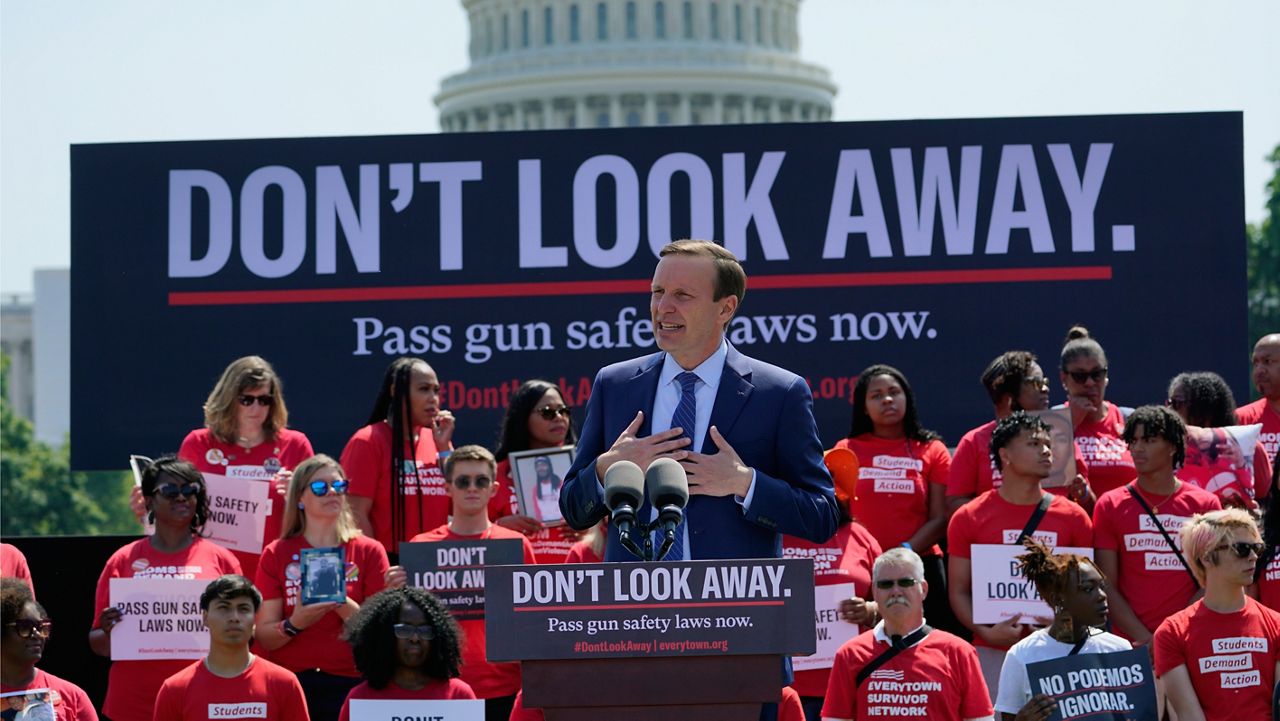Senate Minority Leader Mitch McConnell, a key voice in the Senate Republican caucus, signaled support for the bipartisan gun safety legislation framework released over the weekend in response to recent mass shootings in Uvalde, Texas, and Buffalo, New York.
The announcement comes one day after Majority Leader Chuck Schumer, D-N.Y., pledged that he will get the bill on the Senate floor “quickly.”
The group of 10 Republicans and 10 Democrats on Sunday announced an agreement on a framework for gun safety legislation, which includes enhanced screening for gun buyers under 21, closing the so-called “boyfriend loophole,” which would ban people convicted of domestic violence against a dating partner from buying guns, funding to help states implement “red flag” laws, as well as funding to bolster mental health and school safety programs.
McConnell told reporters on Tuesday that he was "comfortable" with the framework released over the weekend by Sens. Chris Murphy, D-Conn., and John Cornyn, R-Texas, and will support the bill if the legislative text matches the framework.
"I am comfortable with the framework," he said Tuesday. "If the legislation ends up reflecting what the framework indicates, I'll be supportive."
McConnell's signaled support suggests that the bill is all but certain to pass. With 10 Republicans backing the framework in addition to McConnell, the bill is all but guaranteed to overcome the 60-vote filibuster threshold to pass major legislation in the Senate.
The announcement Sunday, Schumer said, on Monday brings “the Senate one step closer to finally, finally, responding to the plague of gun violence that afflicts our nation, terrorizes our children.”
“For the first time in a long time, the Senate has a path forward on legislation that will save lives, reduce gun violence and keep our communities safe,” he added.
While the bill does not contain key provisions sought by President Joe Biden and many Democrats, including a ban on military-style assault weapons and universal background checks, it does carry the endorsement of the president.
White House press secretary Karine Jean-Pierre said Monday that the president sees the deal as a “historic agreement” but that he will give space for the Senate negotiators to flesh out the legislative text.
“It's the most significant legislation that we have seen to reduce gun violence since more than 20 years,” she said. “The president is pleased to see this as a step forward.”
Jean-Pierre added that the president “wants to see this on his desk as quickly as possible” though she admitted the framework does not do everything he would like, such as renewing a ban on semi-automatic weapons or expanding background checks.
“Obviously, it does not do everything that I think is needed, but it reflects important steps in the right direction, and would be the most significant gun safety legislation to pass Congress in decades,” Biden wrote in a statement Sunday. “With bipartisan support, there are no excuses for delay, and no reason why it should not quickly move through the Senate and the House. Each day that passes, more children are killed in this country: the sooner it comes to my desk, the sooner I can sign it, and the sooner we can use these measures to save lives.”
It also carries the support of a large portion of the electorate weary for gun safety reform, according to a pair of polls released last week which show a growing appetite for change.
A survey released last week by NPR, “PBS NewsHour” and Marist University found that 59% of U.S. adults believe it’s more important to control gun violence than protect gun rights — the highest percentage in nearly a decade. Thirty-five percent said protecting gun rights is more important.
Another poll, released last week by Quinnipiac University, found that 74% of Americans favor raising the minimum gun-buying age to 21. Fifty-seven percent of those polled said they support stricter gun laws, compared to 38% who oppose them. In November, 45% said they favored new gun regulations, while 49% said they did not.
Independent Sen. Angus King of Maine, another lawmaker involved in the talks, spoke exclusively with Spectrum News about his hopes for the bill, reflecting on how gun reform negotiations have had little success since he joined the senate in 2013.
King said he feels “elation tempered by practicality” about the new deal, since the framework still needs to be fleshed out into legislative text and get the right number of supporters in the senate.
“There are plenty of steps between here and there,” he said.
King said one of the first gun safety bills he worked on as a senator was a failed 2013 measure to expand background checks, led by Sens. Joe Manchin, D-W.Va., and Pat Toomey, R-Pa.
“To be able to move forward on this finally is important,” he said of the new framework Monday. “I think it's important for the institution to demonstrate to the people of America that even on a tough and contentious and partisan issue, we can find enough common ground to make a difference.”
Schumer also said that lawmakers still have a lot of work to do in order to get the measure passed, but once they produce actual legislative text, he will quickly put it on the Senate floor.
The Majority Leader on Tuesday said that he spoke to the lead negotiators on the bill, who said they are "hopeful" the bill's text will be finalized in the "coming days."
“We must continue working with the urgency that this moment demands, because if we can save even one life from gun violence, it will well be worth it,” he added. “Once the text of this agreement is finalized, and I hope it will be as soon as possible. I will put this bill on the floor quickly, so the Senate can move quickly to make gun safety reform a reality.”
“I urge my colleagues to continue working with the same good faith in most of this work,” he added.
Schumer went on to sing the praises of the agreement, as well as those who crafted it, namely lead negotiators Murphy and Cornyn.
Schumer acknowledged that while the framework “does not have everything Democrats wanted,” it “represents the most significant reform to gun safety laws that we have seen in decades.”
“If enacted, this legislation will make it harder for mass shooters to access assault rifles, by enhancing background checks for those under 21,” he said. “It will prevent tragedies before they happen by helping states with their red flag laws. It will prevent gun violence at home by closing the so-called ‘boyfriend loophole’ and establish new penalties for gun traffickers. And it will make our neighborhoods safer by investing in mental health and community violence intervention programs.”
“This framework is a good and necessary first step towards changing the reality of gun violence in America,” Schumer added. “It will lay the foundation for future action. Most importantly, this legislation will go a long way to saving lives.”
Murphy, speaking on MSNBC’s “Morning Joe” on Monday, agreed with Schumer’s assessment.
“We reached a compromise over the weekend that will save lives,” Murphy said, adding: “This does allow us to break this logjam and it allows us to be set up for future success, but the content of this compromise in and of itself will save lives.”
“The ability to help states pass red flag laws will stop thousands of suicides and homicides, the closing of the ‘boyfriend loophole’ means that domestic abusers … won’t be able to buy guns,” he continued. “The protections for 21-and-under buyers, that means that there's a pause for any 18-to-20-year-old who is going into a store to try to buy an AR-15 … and ability for the police department to intervene.
“And the mental health spending is going to be transformative in and of itself,” Murphy added. "We're talking about billions of new dollars for mental health, a lot of going to underserved communities — that’s going to save lives too.”
“I’m not saying this is foolproof,” Murphy went on to say, referencing how he supports banning assault weapons or raising the age to purchase one to 21, but noted that “I think that's the business we need to be in, trying to pass laws that maybe are not perfect, but substantially decrease the chance that these mass atrocities will ever happen in the future.”
“This is what can get 60 votes in the Senate right now,” he added. “Other changes that lots of my constituents want can't. And I just don't think this time, the answer was for us to do nothing. I think my job was to try to find what is possible.”
Spectrum News' Ryan Chatelain contributed to this report.








